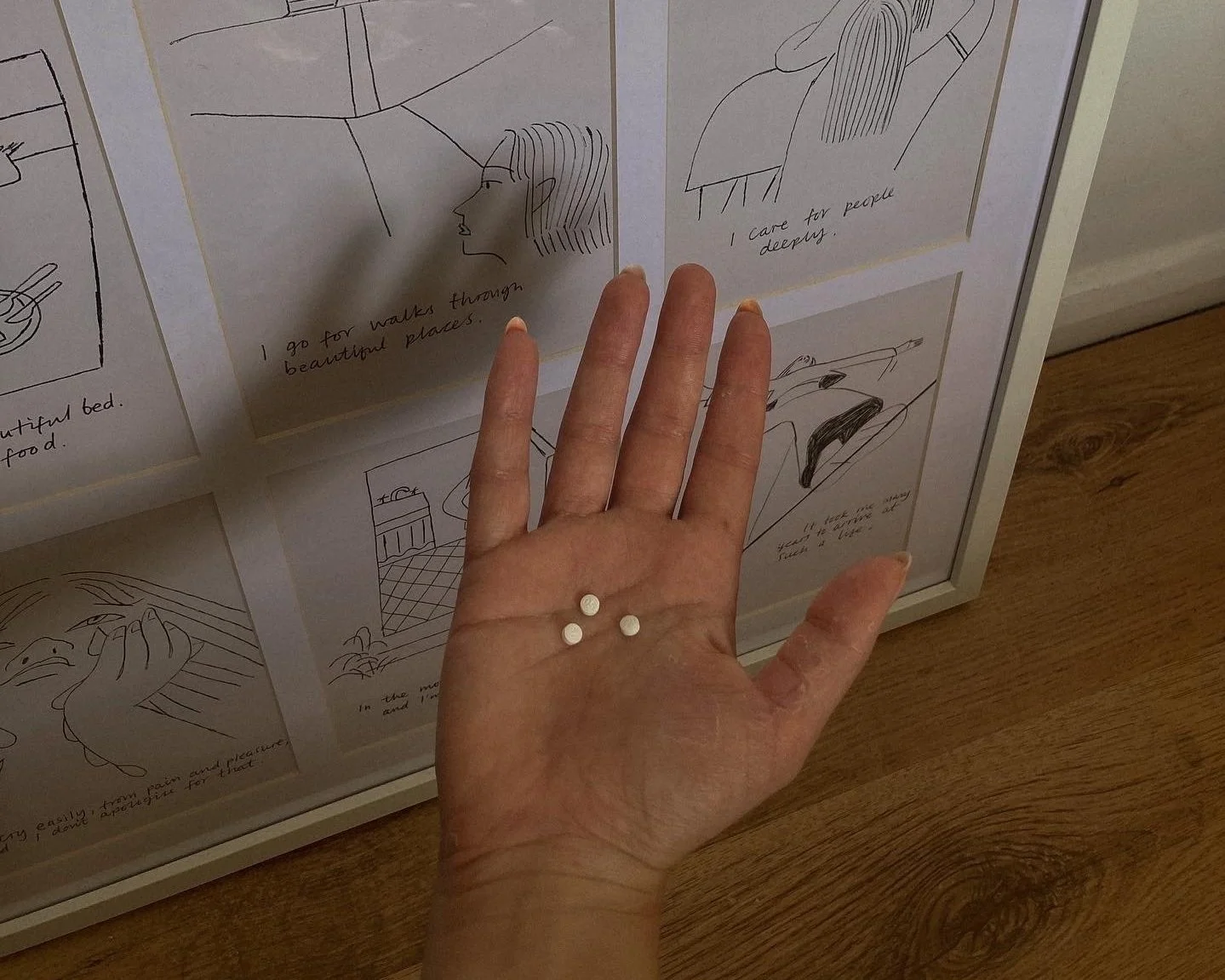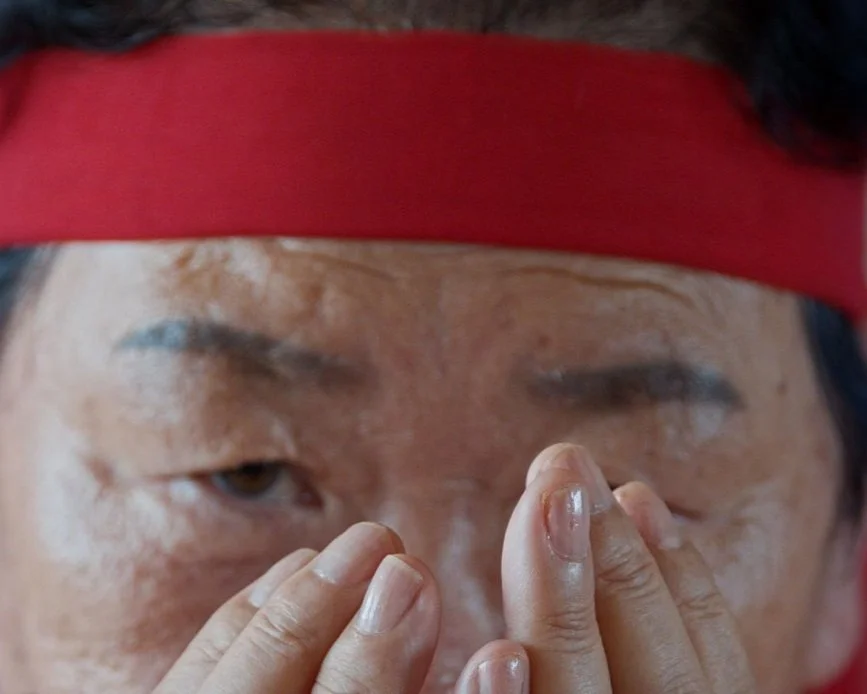Jamila Prowse: What Care and Access Mean to Me
Artist, writer and researcher Jamila Prowse leads a session at Studio Voltaire thinking about definitions of care as they relate to disability and care work. We will read out loud together from three short texts, including two that have informed Jamila’s thinking: Johanna Hedva’s Get Well Soon! (Tega Brain and Sam Lavigne, 2020) and Mia Mingus’s ‘Access Intimacy: The Missing Link’ (Leaving Evidence Wordpress, 2011), alongside Jamila’s own text ‘The True Value of Care’ (Riposte, 2021).
The reading will open up discussions on questions including:
-What does the term care mean to us?
-How has care been co-opted and obscured by institutions?
-Where do we find access intimacy and what does accessibility mean to us?
-How might greater access and disability inclusivity make society more hospitable for all of us?
Readings
Together we will read:
- Johanna Hedva get well soon (Tega Brain and Sam Lavigne, 2020), https://getwellsoon.labr.io/
- Mia Mingus ‘Access Intimacy: The Missing Link’ (Leaving Evidence Wordpress, 2011), https://leavingevidence.wordpress.com/2011/05/05/access-intimacy-the-missing-link/
- Jamila Prowse, ‘The True Value of Care’ (Riposte, 2021) https://docs.google.com/document/d/18k2xfoDBWAioKnGLJzKqwWy7A-qSOEGY3h2ZAmFDFOI/edit
There is no need to read in advance as we will read together, one person and one paragraph at a time, together.
Please bring copies of the texts with you.
About Jamila Prowse
Jamila Prowse is an artist, writer and researcher who works across moving image and textiles to consider methodologies for visualising mixed race identity and the lived experience of disability. She is drawn to stitch making and patchwork as a tactile form of processing complex family histories and mapping disability journeys, and moving image as a site of self-archiving and autoethnography.
Her first artist film, An Echo For My Father (2021), initiated a three-part series and was commissioned by Lighthouse, exploring losing a parental figure and access to one side of your heritage. She is now working on the second and third iterations supported by an Arts Council Developing Your Creative Practice grant. Jamila is a member of the Brent Biennial Curatorial Committee 2021-2 and an Associate Lecturer in photography and moving image at London College of Communication, University of Arts London. Previous exhibitions and screenings include Hordaland Kunstsenter (Bergen, Norway), Obsidian Coast (Bradford, UK) and South London Gallery (London, UK). Her reviews and essays have appeared in Frieze, Elephant, Dazed, GRAIN, Art Work Magazine and Photoworks.
Free, booking required
https://www.eventbrite.co.uk/e/jamila-prowse-what-care-and-access-mean-to-me-tickets-627913124057
Image Description
A hand is outstretched in the centre of a portrait photograph, palm up, with three small, white pills laying in the centre of the hand. Below, wooden, laminate flooring can be seen and a framed series of artworks leaning against a white wall. The hand casts a shadow on the artworks, which are a series of line drawn illustrations by the artist Joey Yu in a white frame with a white mount. Some are obscured, but the top two artworks on the right hand side show a woman looking at a sunset, then in the next frame braiding a friend's long hair. The caption underneath the latter artwork can be seen and reads 'I care for people deeply'. Below, only slightly visible, is an illustration of the same girl walking across a tight-rope, seen from below.
Access
If you have any questions or need assistance with your visit please contact Studio Voltaire on +(0)2076221294 or email info@studiovoltaire.org.
Step–free access
Studio Voltaire has step–free access throughout the gallery, participation and events spaces, cafe, shop and garden.
There is a dropped curb outside of the main entrance of the building and the front door is opened by a push button. The push button is 95cm from the ground.
If you are visiting the offices, there is step free access via the staff entrance. If you are visiting an artist or cultural tenant in the studios on the first floor, a lift is available. The lift has a glass door which can be opened using the handle. The lift dimensions are 150cm x 108cm x 213cm. The lift door dimensions are 90cm x 200cm.
Toilets and baby care facilities
Accessible toilets and baby change facilities are available on the ground and first floor.
All toilets are self-enclosed and all-gender.
The toilets on the ground floor feature a permanent commission by artists Joanne Tatham & Tom O’Sullivan. The interior of the toilets are brightly coloured and patterned, which may affect people who are visually sensitive. You can view images of the inside of the toilets here. The toilets on the first floor are accessible via lift and have plain white walls.
The nearest Changing Places toilet is located in Lambeth Town Hall.
Large Print
Information about current exhibitions and events are available in large print. Please ask at the reception desk for a copy.
Chairs
The FDRG event in the Studio will be seated. Chairs are also available to use throughout Studio Voltaire’s public spaces. Please ask at the entrance desk. There is seating for public use in the garden and entrance.
Assistance animals
Registered service and assistance dogs are welcome in all areas of the building. If you require water bowls, please ask at the reception desk.
British Sign Language (BSL) and Audio Description
Please contact Studio Voltaire if you require a British Sign Language interpreter for this event. All speakers will self-describe at the outset of the event.
Getting to Studio Voltaire
By car
There is no parking, including accessible parking, available onsite. Blue badge holders are able to park on Nelson’s Row where Studio Voltaire is located. There are two disabled parking spaces approximately 27 and 30 metres from the entrance.
By underground
The closest station is Clapham Common, but there is no step free access. The station is 500 metres from Studio Voltaire, or approximately a 3 minute walk.
Clapham South is the closest station with escalator access between the street and the platform. The station is 1600 metres from Studio Voltaire, approximately a 20 minute walk.
The nearest stations with lift access between the street and the platform are Brixton and Vauxhall.
By overground
Clapham High Street is the nearest station, but there is no step free access. The station is 600 metres from Studio Voltaire, approximately a 6 minute walk.
If you would like to share any feedback about how to improve Studio Voltaire’s accessibility, you can contact Studio Voltaire on +(0)2076221294 or email info@studiovoltaire.org.



